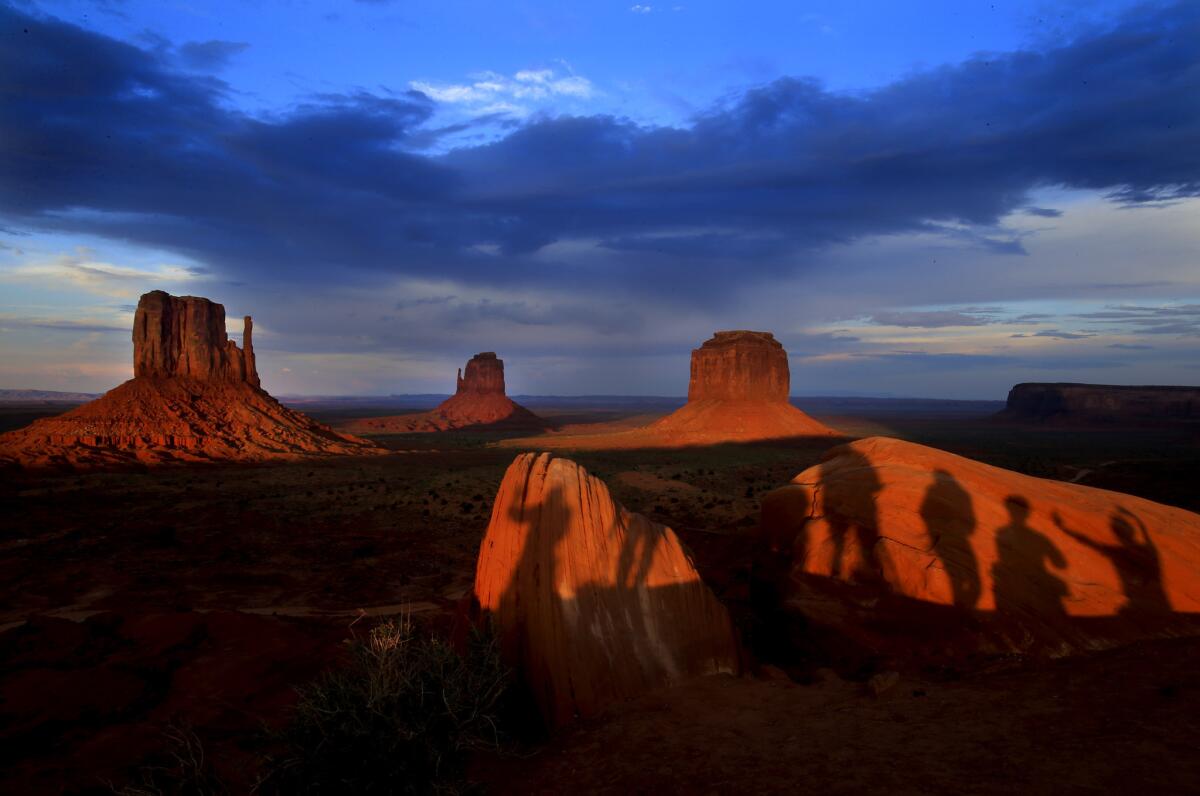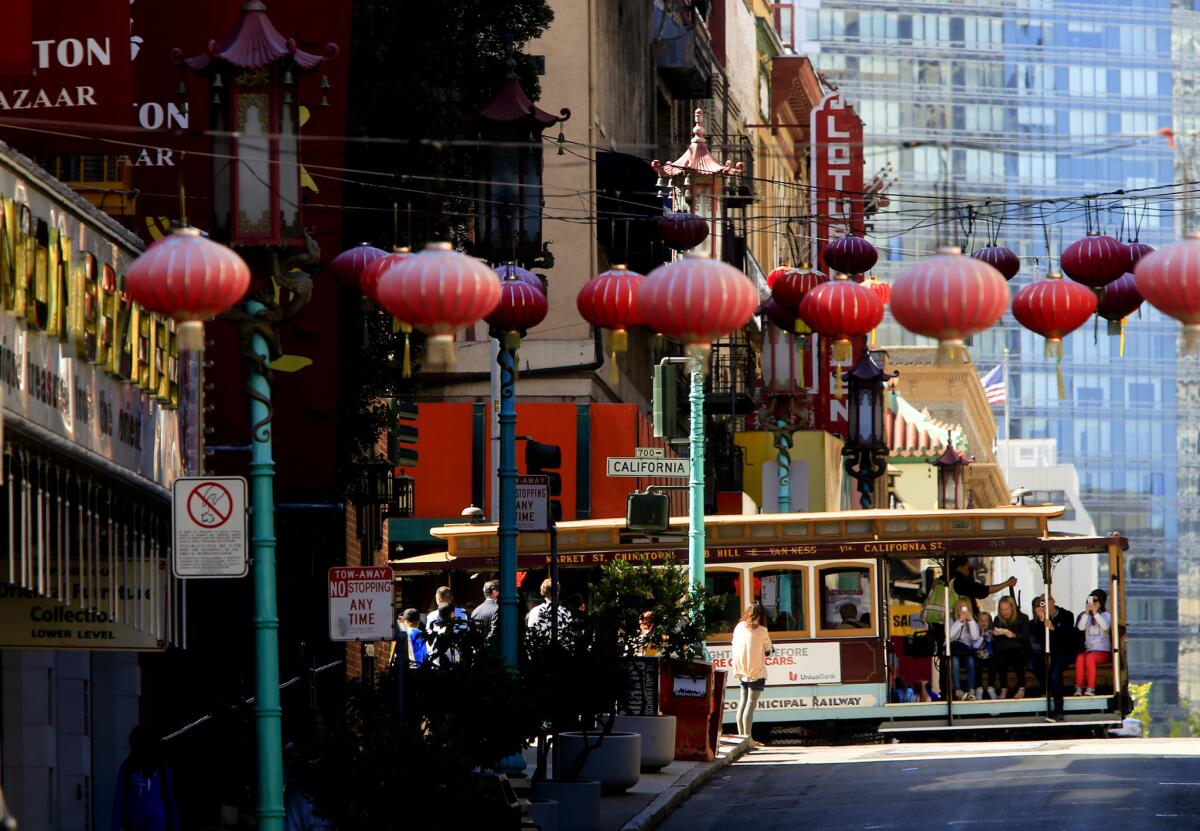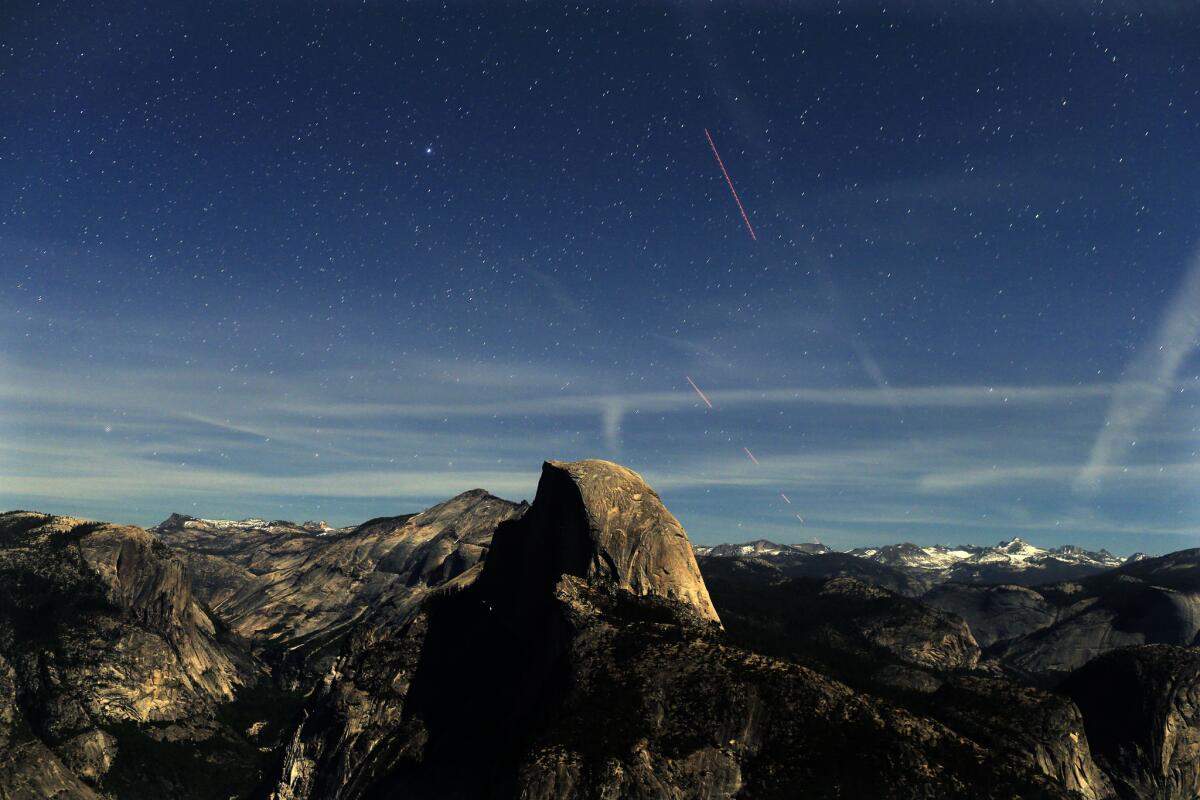Portland’s quirky comeback kid
The revitalized theater, with its electrified-ersatz-Islamic-hallucination exterior, is a focal point of the Hawthorne area. With hippies and hipsters, it’s all very ‘Portlandia.’
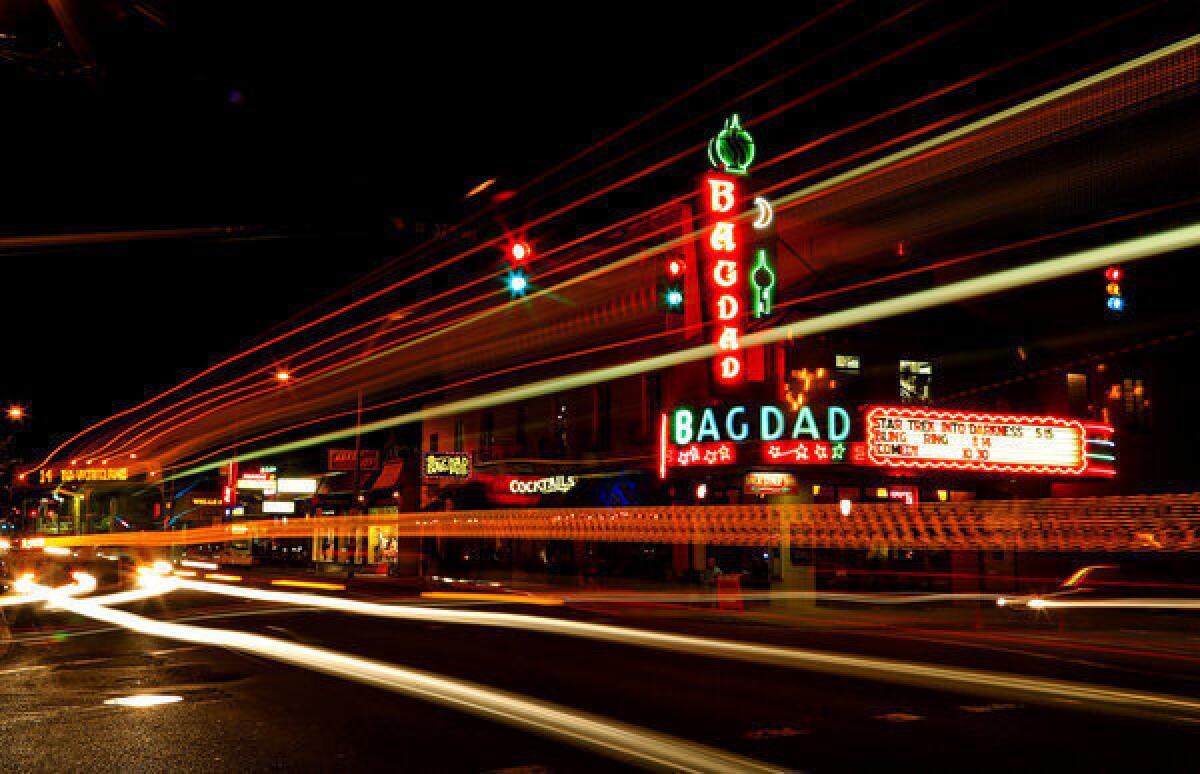
Greetings from fast-changing Portland. On your right, note the dozens of breweries and distilleries, none of which existed until the other day. On your left, take care not to provoke the bicyclists, who may control everything by the day after tomorrow. If you'd like to feed them, locavore treats and artisan coffee only, please.
And now to today's postcard picture, just ahead among the hippies and hipsters of the Eastside's Hawthorne neighborhood: the Bagdad Theater & Pub, built in 1927.
The Bagdad is not just a longtime landmark on the less-shiny side of town; it's also proof of the powers of historic preservation, neon and beer (not necessarily in that order). In a city in love with making things and recycling them, it's an old postcard with a fresh message scrawled on back. Times photographer Mark Boster and I recently spent several days exploring it and the neighborhoods nearby.
"Bagdad," by the way, was a common spelling in the '20s. And somehow, the missing "H" contributes to the whole electrified-ersatz-Islamic-hallucination effect of the theater's exterior. But inside, the Bagdad is about movies, beer, burgers and pizza. You can eat a meal and drink beer in the theater, a concept that's novel in Los Angeles but old hat here.
This month's schedule, typically eclectic, includes screenings of "The Great Gatsby" (2013) and "Repo Man" (1984), a panel discussion on Portland in the '60s and a documentary on elk hunting.
Seen enough elk hunting? Sit at one of the pub's sidewalk tables (well, between cloudbursts), round the corner to shoot pool in the Back Stage Bar or have a smoke at the cigar bar Greater Trumps. All fall within the Bagdad's domain.
And within a few blocks, you can shop for books at Powell's (which opened one shop in 1987, another in 1992); check out old vinyl at Jackpot Records, wolf down breakfast treats from the Waffle Window at dinner time or order at the counter of the merrily chaotic ¿Por Qué No? Taqueria.
Do not, however, try to sleep at the Sapphire Hotel near 50th Avenue. Maybe it once was a seedy flophouse favored by sailors and hookers, but it's now an elegantly dim restaurant and bar featuring $9 cocktails that threaten to become novellas. From the menu:
"Lounge Singer. That woman had the voice of a thousand cigarettes. I pined for her. Fig bourbon, rhubarb, pomegranate molasses."
Already, you may be thinking of "Portlandia," the 4-year-old Web/TV comedy show that deftly sketches the whole sustainably sourced, beer-soaked, coffee-powered, homemade, bike-driven scene. Have you seen the one with the Cultured Caveman, a food stand specializing in paleo-diet snacks? Or Hopworks, the all-organic eco-brewpub? Or the street-corner salesman who peddles micro-kites that fit in your shirt pocket?
No, you have not. Because those are all real. (And by the way: From 1861 into the 1880s, Hawthorne Boulevard was known as Asylum Avenue because its most notable building, now gone, was Dr. J.C. Hawthorne's Oregon Hospital for the Insane.)
But let's get back to the 3700 block of Hawthorne, where the Bagdad marquee gleams red and green at dusk and an old vaudeville curtain hangs above the bottles in the Back Stage Bar.
"It's got that haunted feeling. You just don't get that in a modern building," Rachel Flesher, Bagdad property manager, said recently.
When the theater went up, America was still abuzz over the discovery of King Tut's tomb in Egypt, and designers were entranced by all things Arabian, or Islamic or, you know, sort of like that. Accordingly, the Bagdad featured a grab bag of Arabian, Moorish and Mediterranean flourishes, including usherettes in harem garb. For the opening, somebody brought a live camel.
But the Great Depression was brewing, "talkies" were coming and silent-movie palaces were about to go out of style. Over the decades, Bagdad owners and managers zigged and zagged, first booking vaudeville acts, later sectioning space off to make a duplex, then a triplex.
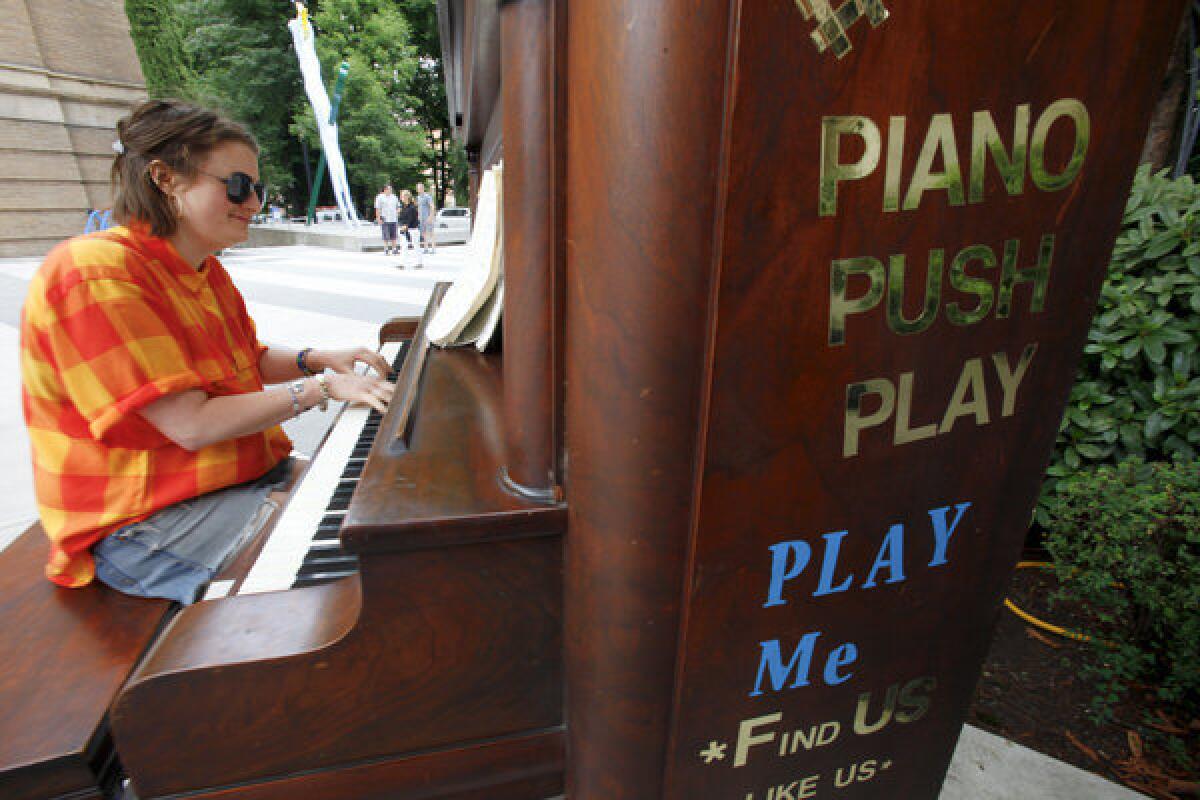
Random players are encouraged to tickle the ivories at the Piano Push Plays around Portland, Ore. This particular piano was near the Portland Art Museum. ( Mark Boster / Los Angeles Times ) More photos
And then in 1991, brothers and pub moguls Mike and Brian McMenamin bought and renovated the theater, returning it to a single-screen configuration. The key innovation, borrowed from another McMenamin project a few years before, was the view 'n' brew angle.
"There's nothing like going to watch a movie with a pint of Hammerhead," Flesher likes to say.
The history-loving, hippie-friendly McMenamin empire has grown to more than 50 pubs, breweries and hotels in Oregon and Washington, a remarkable story — but you know what familiarity breeds. With the many McMenamin successes has come occasional local sniping about bland fare and seemingly stoned staffers. ("McMinimize your expectations," a sour commenter once wrote on Portlandbarfly.com.)
It's true that the Bagdad's barbecue chicken pizza wasn't my favorite meal in Portland, but it had a nice smoky taste and the Terminator Stout was on the money. Our waitress was not only sober and pleasant but also miffed by the number of able-bodied young beggars on the boulevard.
Now a change is coming. In late September or early October, Flesher said, the Bagdad will close for one to two weeks for installation of new seats, digital projection and sound systems, a new screen and perhaps a tweak to the menu. The new Bagdad, Flesher said, will focus more on first-run movies.
I can imagine that this mainstream move might trouble people with "Keep Portland weird" bumper stickers on their kid-sized bicycles, maybe even inspiring a "Portlandia" episode. I'm reserving judgment and clinging to the best moment of this trip, which the Bagdad helped make possible.
It was night. I was standing across the street from the theater at Powell's. Tyson Birnbaum, the bookshop's assistant manager, was at the counter, about to compare his Portland experience to a Ray Bradbury story about a planet that gets two hours of sunshine every seven years. Just outside the window, a sidewalk fiddle player launched into an improvisation for an aspiring young author who wore a black mask and wielded a VW hubcap shield.
Naturally, Boster stepped up to photograph them. For a moment, the three of them were joined in a circle dance of creation, affectation and documentation, all backlighted by those red and green Bagdad lights.
"Now," I thought. "Now, I'm in Portland."

Timeline: The life of the Bagdad Theater in Portland, Ore.
1927 Southeastern Portland, Ore.'s Hawthorne corridor is transformed by the opening of the Bagdad Theater. Bankrolled in part by Universal Pictures, it's a 1,500-seat "oasis for entertainment," with one enormous electric BAGDAD sign hanging over the street and a second jutting from the roof.
1940s A new manager turns the theater toward vaudeville acts. The Bagdad sign over the street has come down and a new marquee is wrapped around the front of the building. As the theater's vaudeville era winds down in 1948, one of its final acts is the Will Mastin Trio, including a young singer-dancer named Sammy Davis Jr.
1973 After decades of decline, the Bagdad is split into a two-screen operation by a new owner. Eventually, there will be three screens: one in the former balcony, one in the former backstage area and one in the main space. The pipe organ has been gone since the 1950s.
1975 Stars Jack Nicholson and Louise Fletcher join producer Michael Douglas at the Bagdad for the Oregon premiere of "One Flew Over the Cuckoo's Nest," which was shot at the Oregon State Hospital in Salem.
1979 B-movie king Russ Meyer screens the local premiere of "Beneath the Valley of the Ultra-Vixens" at the Bagdad.

A present-day photograph of the Bagdad Theater contrasted with an image taken in 1941. (Color image: Mark Boster / Los Angeles Times. Black and white image courtesy of McMenamins.)
1983 Several blocks west of the Bagdad at 1629 S.E. Hawthorne Blvd., fledgling entrepreneurs Mike and Brian McMenamin open their first pub, the Barley Mill. Two years later comes their first brewpub, Hillsdale Brewery & Public House in southwestern Portland.
1989 The Bagdad sign over the roof is gone, and the orchestra pit is covered. Yet so much of the old landmark remains that the theater is added to the National Register of Historic Places.
1991 The McMenamin brothers buy the property, renovate it, return it to one big screen with seats for 590 and rename it the Bagdad Theater & Pub. Portland-based filmmaker Gus Van Sant holds a screening of "My Own Private Idaho." The theater also starts hosting authors' readings and music performances.
2006 The Bagdad's Back Stage Bar opens, making use of former behind-the-screen storage space, with a ceiling about seven stories high. A series of connected rooms includes space for several pool tables.
2013 Still banking on brew 'n' view customers, the Bagdad lays plans for digital projection, new seats and first-run movies.
Sources: https://www.oregonencyclopedia.org, https://www.mcmenamins.com, McMenamins historian Tim Hills, Bagdad Theater & Pub property manager Rachel Flesher

Portland makes the page: Two experts recommend the best books on the city
Who's better than two guys behind the counter at Powell's to suggest some Portland reading?
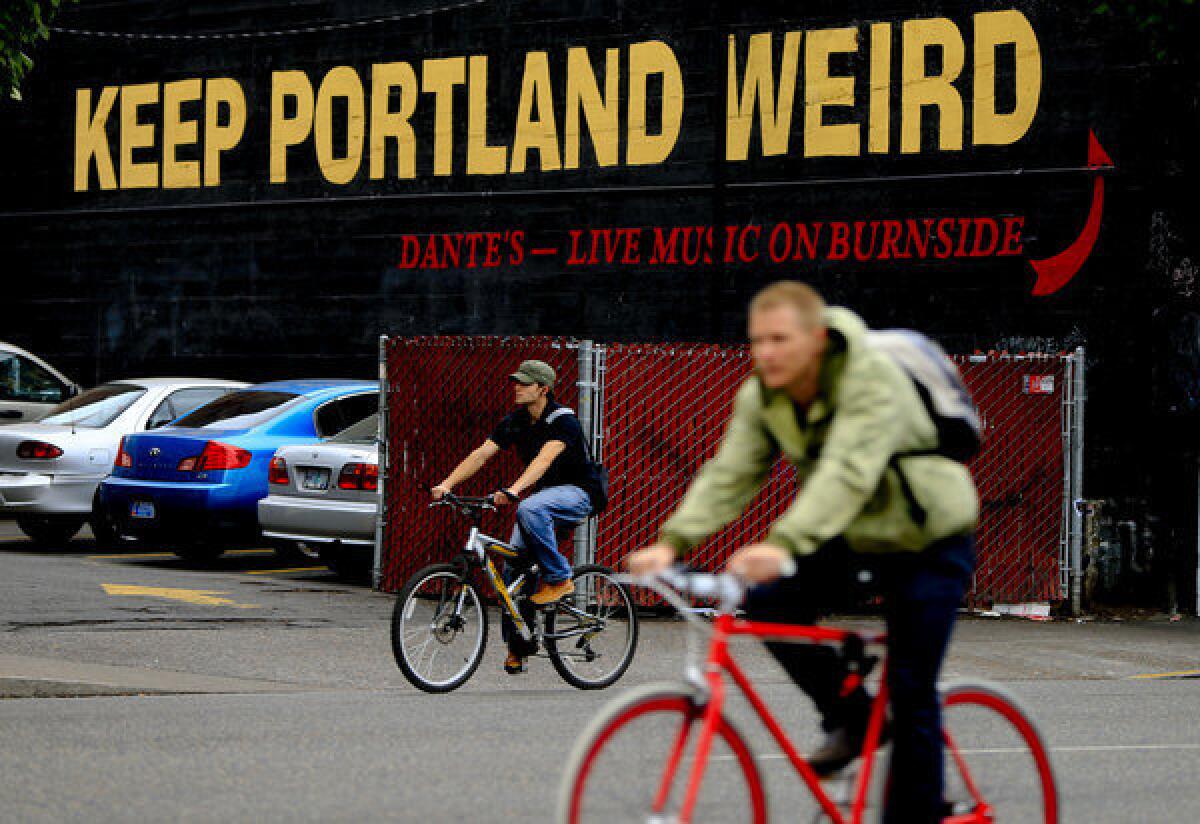
A sign pokes fun at Portland, Ore., while also advertising a downtown nightclub. ( Mark Boster / Los Angeles Times )
More photos
Here are some ideas from assistant manager Tyson Birnbaum (who came to town 13 years ago from Hawaii) and bookseller Keith Brooks (a 55-year-old lifer), both at the Powell's on Southeast Hawthorne Boulevard. (The order here is alphabetical by author, but fans of Chuck Palahniuk should know that both booksellers thought of "Fugitives and Refugees" first.)
Birnbaum: "This is Portland: The City You've Heard You Should Like," by Alexander Barrett. A collection of 13 essays, often tongue in cheek. (Brooks objected, saying, "It was written by a guy who doesn't even live here.")
Brooks: Chelsea Cain's mystery novels. Cain's "Gretchen" series follows Portland detective Archie Sheridan and killer Gretchen Lowell. It begins with "Heartsick," published in 2007.
Birnbaum: "Wild in the City: Guide to Portland's Natural Areas," edited by Michael C. Houck and M.J. Cody.
Brooks: "Portland: People, Politics and Power, 1851-2001," by Jewel Lansing. Inside history from a woman who was Portland's elected auditor from 1983-86.
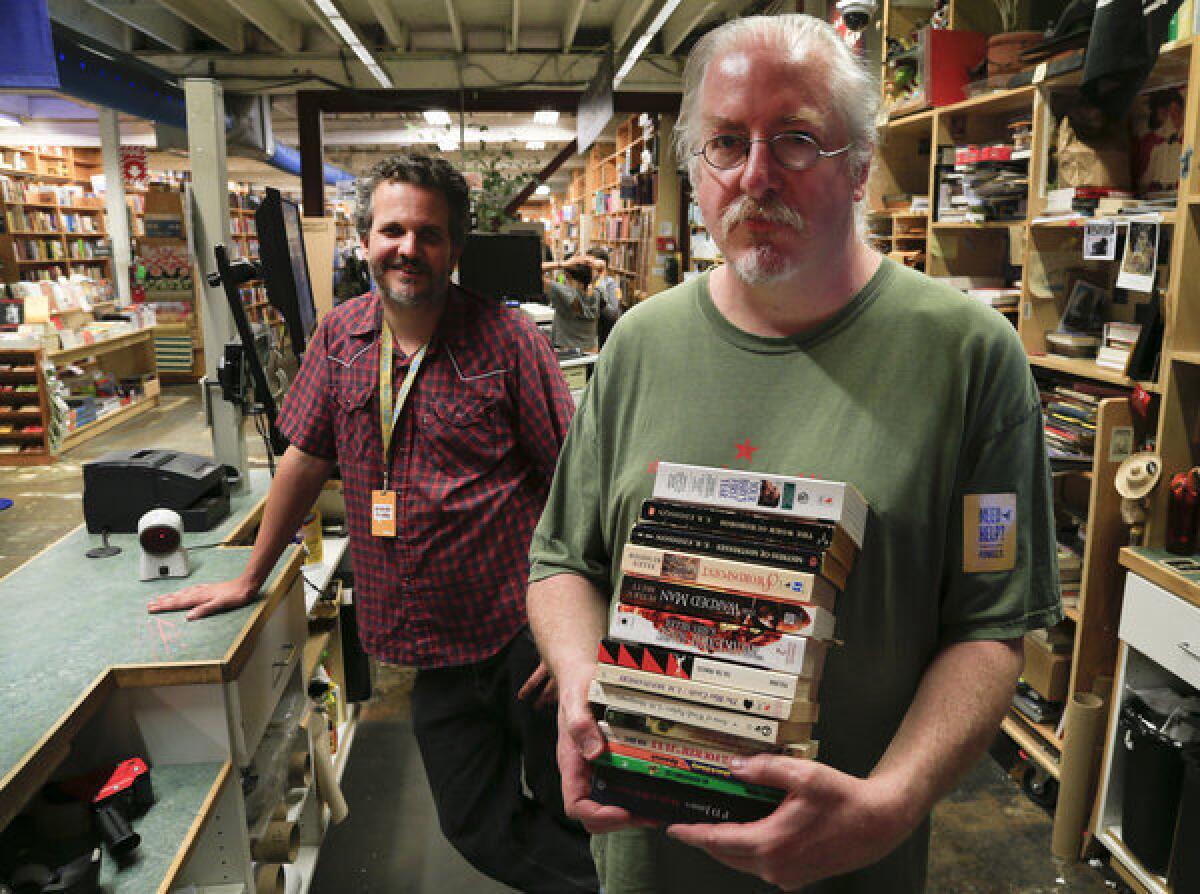
Tyson Birnbaum, left, and Keith Brooks pause at Powell's bookstore on Hawthorne Boulevard in Portland, Ore. (Mark Boster / Los Angeles Times) More photos
Brooks: "Blue Moon Over Thurman Street," by Ursula K. Le Guin. Le Guin, best known as a novelist, is a longtime Portlander. For several years in the 1980s and 1990s, she teamed with photographer Roger Dorbland to assemble a portrait of Thurman Street, which stretches across the city for 45 blocks. (Bonus tip: Le Guin's dream-laden novel "The Lathe of Heaven," published in 1971, takes place in the Portland of 2002.)
Brooks: "Red Hot and Rollin'," a collection of essays, edited by Matt Love, about the Trailblazers' 1976-77 championship season. Early copies came with a DVD of a documentary about the team.
Both: "Fugitives and Refugees: A Walk in Portland, Oregon," a nonfiction work by novelist Chuck Palahniuk, better known for "Fight Club" and several other works. Chosen by both.
Birnbaum: "Portland Confidential: Sex, Crime and Corruption in the Rose City," by Phil Stanford. "It's an underground history of Portland."
Birnbaum: S.L. Stoner's historical mysteries, set in 19th and early 20th century Portland. The hero of the series is named Sage Adair, and the titles include "Timber Beasts" and "Land Sharks."
Brooks: "Zazen," a 2011 novel by Vanessa Veselka that won the 2012 PEN/Robert Bingham Prize for debut fiction. It's "set in a slightly alternative universe that resembles Portland and parts of San Francisco."
christopher.reynolds@latimes.com
More Postcards From the West
Sign up for The Wild
We’ll help you find the best places to hike, bike and run, as well as the perfect silent spots for meditation and yoga.
You may occasionally receive promotional content from the Los Angeles Times.
